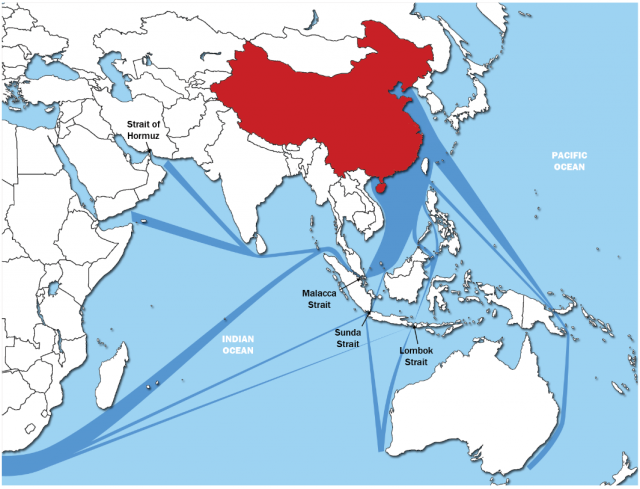Editor’s Note: This article follows our earlier AUKUS – Elementally Sensible. article that explains the importance of AUKUS via maps of sea-lanes.
Just a month or so ago, the story was how America has NOT won a war for decades despite waging war around the world. The list given was long, Korea, Vietnam, Iraq, and then Afghanistan with that humiliating exit.
People forget that these wars were neither strategic nor significant for America. They were not based on core strategic interests or preservation of America’s dominance. America kinda ended up in these conflicts because of some vague moral considerations, mostly made up. These were wars entered out of disrespect for the other people & ended up with newfound respect for them, whether they be the Vietnamese in 1970s or the Pakhtun Afghans in 2021.
But the impact of these “defeats” on America was negligible. Despite America losing the wars & exiting those countries, the so-called winners ended up asking for America’s help post US-exit. Look at Vietnam. Within a few years of US exit, Vietnam began trying to cozy up to America both for financial support & strategic support against China. America left Iraq but Iraq really doesn’t want America to go. Even the victorious Pakhtun-Afghans are still trying to cozy up to America both for money & even to potentially balance the looming presence of China & Russia on their borders.
Contrast these insignificant setbacks to America’s behavior in the Big Wars that counted. When you do that, a pattern emerges. America doesn’t jump into those the way America jumped in Vietnam, Iraq or Afghanistan. America takes its time, studies the opponent and then begins long term moves. And then slowly but surely, the full military-financial-diplomatic might of America is relentlessly brought to bear on the opponent.
That America played a cold, hard, ruthless game and that America always won the Big Wars, the wars that kept America as the sole superpower in the World. And the opponents receded into a mediocre second-rate role in the world, be it Germany, Japan in the 1930-1940s, or the Soviet Union in the 1950s-1980s.
This is important to recall because that cold hard America is re-emerging with a singular focus against a new major opponent, an opponent that combines military strength with global economic power. And the victor in this USA-China game will remain or become the new superpower in the world.
That is how we view AUKUS. It is a resurrection of the international alliance that won the naval sphere of WWII. It is a big deal, indeed. The best proof of this is the global outcry against it from America’s friends & adversaries.
1.AUKUS – EU
American power rests on its dominance of the world’s oceans via its Navy and Air Force. That power isolates the opponent to a local area & reduces their economic reach. America did not invade Japan with land forces and the American army in Europe fought only the smaller part of the land war against Germany. U.S. naval counteroffensive against Japan in WWII began with a victory near Australia & U.S. naval dominance in the Atlantic began by the British giving up their bases to USA.
Today, the Atlantic is not at risk with the Russian Navy virtually absent from it. And Brexit actually strengthened U.S. power over the Atlantic. The exit of Britain from EU was based on the cold hard realization that Britain’s strategic interests are and will become even more closely aligned with America than with the EU.
Now with Australia fully on board with AUKUS, the naval alliance of WWII is re-emerging. And it is an alliance based on old-fashioned cold hard power. Make no mistake – Australia has now committed to a hard alliance that brings with it the determination to wage war with America if necessary. Such an alliance is only possible with partners that not only have the same strategic interests but also share a common way of thinking.
This is not an alliance to wage war on China, the next big opponent but an alliance that would be prepared for war if it comes. And that war, if it comes, will be fought on sea and in air. No wonder the natural participants in this alliance are the three island nations – USA, UK & Australia, participants that have a history of waging a big war together and participants that share a common ethnic, culture and language.
When viewed this way, France was really the odd guy out. France could not realistically commit to waging war against China if necessary. The strategic interests of France are inseparable from those of the EU and those look eastwards to Russia and south to Africa. France gets it and that is one reason France is so angry. Another reason of course is that this again is a British win over France consistent with the long history of these two nations.
EU is also angry because the AUKUS alliance publicly exposes the existential weaknesses of the EU. Together the EU might rival America in economic size but it is smaller than puny militarily. Since Russia is no longer a Big Power capable of challenging America at sea, the military significance of EU’s geography has eroded.
Thus AUKUS is a non-vocal but public assertion of this reduced importance of the EU. It also shows that that Britain came out better by exiting EU than EU did by letting Britain go. No wonder the EU is talking about backstabbing and France is so livid.
2. AUKUS – ASEAN
The AUKUS alliance is creating serious unease in the South-East Asian region. Naturally because the countries in the ASEAN, especially Philippines, Indonesia, Malaysia and Vietnam are directly in the line of AUKUS-China fire, both in trade & battle. And none of them has the heft to do anything about it.
And they see what is already happening. As an article in Financial Review points out,
- “… while It will be decades before Australia deploys its nuclear submarines, … much of the groundwork for defence cooperation has already being laid. Last week’s AUSMIN flagged major advances in Australia-US force posture, including more rotations of US aircraft and warships through Australian bases, and the establishment of a joint maritime logistics, sustainment and maintenance hub to support allied military operations. … These initiatives could soon see US maritime patrol and anti-submarine warfare aircraft take advantage of Australia’s considerable investments in forward operating infrastructure on the Cocos Islands and at RAAF bases Darwin and Pearce. … “
All this has to create unease within the ASEAN even though they will be the biggest beneficiaries of open & free Indo-Pacific sea lanes. And some within the ASEAN have been more openly honest than others:
- Jeff M. Smith@Cold_Peace_ – Sep 22 – “The Philippines welcomes Australia’s decision to establish an enhanced trilateral security partnership with [US & UK, AUKUS]. ASEAN member states, singly and collectively, do not possess the military wherewithal to maintain peace and security in SE Asia” https://dfa.gov.ph/dfa-news/statements-and-advisoriesupdate/29484-statement-of-foreign-affairs-teodoro-l-locsin-jr-on-the-australia-united-kingdom-united-states-aukus-enhanced-trilateral-security-partnership
3. AUKUS-India
Charles-Maurice de Talleyrand-Périgord, the renowned diplomat of the Napoleon era, used to say that “speech was given to man to conceal his thoughts“. A modern-day version of this can be found in the words & facial expression of Harsh Vardhan Shringla, India’s Foreign Secretary below:
- The Times Of India@timesofindia – – AUKUS a security alliance, not relevant to Quad: India toi.in/ckvEqb/a24gk
Yeah right! India has to be thrilled at both the idea & the implementation of AUKUS. Mr. Shringla added,
- “From our perspective, [AUKUS] is neither relevant to the Quad nor will it have any impact on its functioning.”
Yeah double right!! Talleyrand would be proud of Shringla. The real story was revealed in
- Sidhant Sibal@sidhant – – Australian PM @ScottMorrisonMPtells me he had an “outstanding” meeting with Indian PM Narendra Modi @WIONews
- “Australia’s new Maritime Logistics Support Agreement with India and pending Reciprocal Access Agreement with Japan will pave the way for both to use defence infrastructure and logistics facilities in Australia’s north. They will allow Australian forces to do the same at more operating locations in the Indian Ocean and East China Sea, just as US forces have done with growing frequency.”
- “Other measures such as a standing Indo-Pacific Naval Task Force reportedly being considered by the Biden administration would provide additional means of integrating Quad partners for peacetime deterrence operations.”
India & Australia are two ends of the Indo-Pacific spectrum and they have been coming together both in thought & deeds in both the diplomatic & maritime spheres. The cold hard alliance between Australia & America makes the Australia-India relationship more robust & valuable.
So what does AUKUS mean for India? The best way to describe it is by re-orienting what Robert Kaplan* wrote about US-India in 2012:
- “It is not a matter of what AUKUS can do for India. Rather, it is the very fact that the AUKUS‘s rise, militarily and economically, automatically balances against China because of Australia’s proximate position on the map. Thus, the rise of AUKUS, … is probably the best piece of strategic good luck India has had since its independence. …. AUKUS can help India, but only if India plays its hand subtly.”
So far, China only had weak ASEAN countries & an isolated Australia facing its rich belly. No wonder China could get aggressive in other areas like the Indian Ocean & the Indian subcontinent. With AUKUS, China now faces the US Navy, Air Force & Marines in its vulnerable & existentially critical belly. The more China focuses its resources against the US military presence in Australia, the less resources & attention it might devote to other areas like the India-China line of control.
And a stronger & more confident Indian Navy can challenge Chinese adventures in the Indian Ocean and help keep the Chinese Navy more or less contained in the Indo-Pacific.
*Robert Kaplan’s article titled India’s Riveting Centrality said the following which we re-oriented & re-phrased above:
- “It is not a matter of what India can do for the United States. Rather, it is the very fact that India’s rise, militarily and economically, automatically balances against China because of India’s proximate position on the map. Thus, the rise of India, however uneven and admittedly over-hyped, has been the best piece of strategic good luck the United States has had since the end of the Cold War. ….. India can help the United States, but only if the United States always plays its hand subtly.”
Send your feedback to [email protected] Or @MacroViewpoints on Twitter

